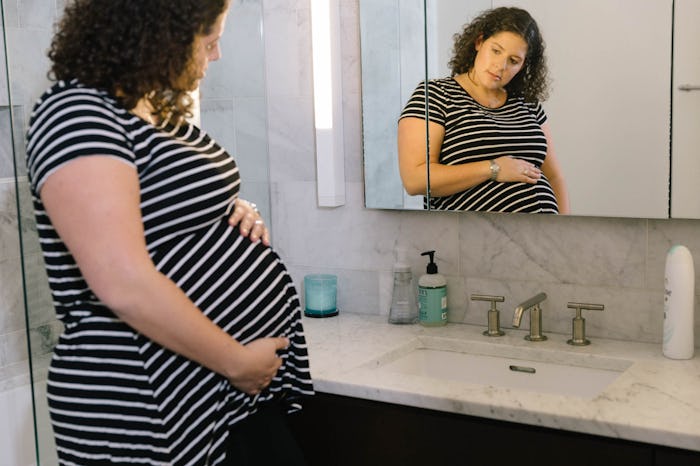Life
Here's How Your Baby Feels In The Womb During Those Last Few Weeks
The third trimester is nothing anyone could possibly consider comfortable. Your whole body feels swollen and achy. You have to pee all the time, your body stops feeling like your own, and eating? Forget about it. There isn't room enough in your stomach to eat a real meal thanks to your ever-expanding womb. That baby is now huge and taking up every square centimeter of real estate in your torso. It can't be comfortable for them to be so squished and their movements so limited by their size, right? I wonder, are babies uncomfortable in the womb?
It stands to reason that a baby which is nearing its birthday would be capable of feeling discomfort in its intrauterine environment. It certainly seems as though they must be given their slow, methodic movements that signal as much to the mother. From the perspective of a mother, the rolls and stretches feel like someone settling into a better position in which to hang out for a few hours. However, according to the website The Naked Scientists, babies likely do not feel their position in the womb with the same vigor and in the same manner that you or I would under similar conditions.
In the last several weeks of my pregnancies, it felt like my babies were constantly trying to seek out more space. I often wondered what it was like for other mothers. Understand that I am 6 feet tall with an absurdly long torso and deep pelvis. I have nothing but room for baking babies. However, my closest girlfriends are, well, not quite so gifted in the torso department, and I couldn't imagine what that would feel like for them or their developing fetuses. Do both get more uncomfortable more quickly? I cannot imagine an alternative scenario.
There is some research on the subject of intrauterine pain experienced by fetuses, but that is with significant disruption to their environment and during procedures which pain seems utterly inevitable. The study published in Lancet looked at cortisol levels in fetuses during necessary needling procedures performed whilst the baby remained deep in its mother's womb. The results were fairly conclusive in that the babies did put off increased levels of the stress hormone during the course of the procedure, but that is a fair bit away from just having your arms placed too close to your face.
What would be the standard for discomfort in a being that isn't fully aware of its surroundings? Moreover, is their routine movement just that, and not some internal awareness of discomfort making itself known?
According to Psychology Today, it is absolutely possible for your baby to feel uncomfortable in the womb starting at around 32 weeks. At that point they are nearly at term, and act in much the same manner as neonates do after they are born. In fact, they consider birth only a minor psychological event. The baby responds to stimuli, has periods of alertness and awareness, and they even dream.
However, most of their time, between 85 and 95 percent of it to be exact, is spent sleeping and dreaming, according to the article. Much of the movement happening in your uterus is during their sleep cycle. While all of us have become uncomfortable in our beds at night, causing us to toss and turn, we are not as aware of our own discomfort as we are while conscious. It's only when it truly begins to disrupt our sleeping habits — like in the last month of pregnancy — that we feel the effects of the discomfort.
So, do babies get uncomfortable in the womb? It's possible, but it's also possible they don't really notice it all that much. Certainly not as uncomfortable as you are with them in your womb.
Check out Romper's new video series, Bearing The Motherload, where disagreeing parents from different sides of an issue sit down with a mediator and talk about how to support (and not judge) each other’s parenting perspectives. New episodes air Mondays on Facebook.
